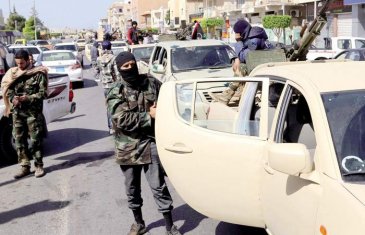Connections between climate and security continue to be debated inside and outside of academia. Last week, I attended a workshop at the Woods Institute for the Environment at Stanford University, together with Nina von Uexkull and nine other invited participants representing a variety of academic disciplines and viewpoints, to discuss impacts of climate variability and… Read more »
The Political Economic Logic of Liberal Exceptionalism
By Jacqueline Best These are interesting times for scholars interested in the concept of “exceptionalism” and emergency. As I have pointed to in my recent article in Security Dialogue, “Security, economy, population: The political economic logic of liberal exceptionalism,” prior to the recent wave of right-leaning election wins it seemed that we were entering into… Read more »
This Week in South Sudan – Week 49
Tuesday 5 December South Sudan still owes Sudan USD $1.3 billion to settle an oil agreement from 2012 according to former deputy finance minister Mou Ambrose Riiny Thiik. Thiik was removed from his position after he stated that GoSS is unable to pay its civil servants due to empty state coffers. GoSS later promised to… Read more »
Making Our Planet Great Again: Climate Diplomacy and Cooperation at COP23
A measured dose of optimism and small steps towards implementing the Paris Agreement were overall good outcomes for this year’s climate conference held from November 6-17, known officially as the 23rd Convention of the Parties (COP23) to the UN Framework Convention on Climate Change. Despite global security concerns, there was little of the rhetoric from earlier COPs where the security implications… Read more »
Making the Invisible Visible – Satellites, Visual Technologies and Environmental Security
By Delf Rothe How can satellites promise to predict future environmental risks and threats? Global warming and resulting environmental changes are unfolding at an ever-faster pace. Natural disasters threaten the well-being of communities across the globe and debates around whether environmental change can (or should) be considered security risks are more topical than ever. Seeing… Read more »
Impunity, the Postcolony and the Promise of Justice
By Henrique Furtado ‘Impunity’ figures in 9 out of 10 lists of the biggest difficulties faced by societies in the so called Third World. Ask anyone for a quick synthesis of the ‘problem’ with African, Asian, Latin American countries and impunity – the absence of punishment for those who violate moral, legal or social codes… Read more »
This Week in South Sudan – Week 48
Tuesday 28 November The US threatens to take further action against GoSS if it do not end violence and allow UNMISS to carry out their mission. US diplomat Nikki Haley tells the UN Security Council “words are no longer sufficient.” GoSS welcomed the announcement by the Government of Kenya that all citizens from East African… Read more »
“Dimming the Sun” and the Implications of a ‘Plan B’ to Prevent Global Warming
By Olaf Corry What security problems are likely to be involved in developing and using technology to deliberately modify the global climate ? Some argue that effective global action to prevent global warming is too difficult politically, and that ‘dimming the sun’ should be explored. The idea is that a possible way to reduce climate… Read more »
How Far Should We Go to Stop Migration to Europe?
The police, the military and militia groups in Libya are keeping refugees away from Europe. Reports link this situation to funding from the EU and Italy. The money passes through intermediaries, but Europe must bear responsibility nevertheless for making the funds available.
To restrict the numbers of refugees arriving from Africa, the EU and several of its member states are pursuing a policy that in practice relocates border controls from Europe to the mainland of North Africa. This started with measures at Europe’s land borders and then moved out into the Mediterranean with initiatives including Operation Sophia. Today we see European attempts to control migration being extended to the North African coast, and particularly to Libya. Measures include support to the Libyan coastguard, strengthening border controls in the south of the country, and offering people smugglers what are officially known as ‘alternative employment initiatives’. The latter may in reality be payments to militia groups to prevent refugees from coming to Europe.

Armed men in Sabratha refugee camp outside Tripoli. Photo: Between Libyia and Italy
Let the Desertification Zombie Rest in Peace
The myth that African agriculture and livestock farming is causing desertification originated early in the colonial times. The reason was that colonial authorities wanted to exploit resources for their own profits. Efficient management of natural resources was presented as part of the white man’s burden. The losers were smallholder farmers and herders who lost access… Read more »